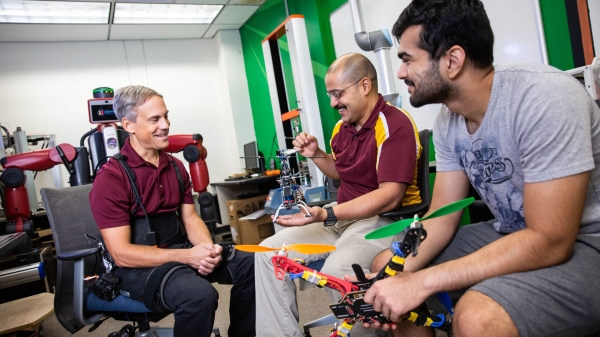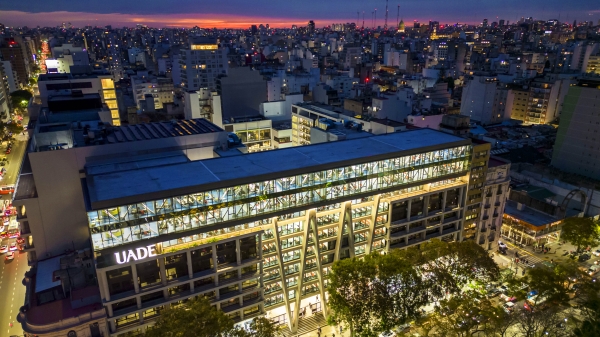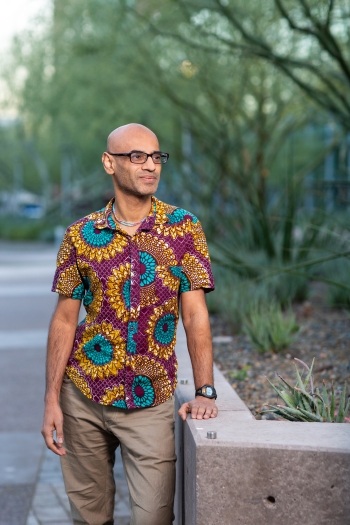ASU professor earns Outstanding Postdoctoral Mentor Award
Arvind Varsani, a molecular virologist, awarded for commitment to educational excellence
Arvind Varsani, professor in the School of Life Sciences, the Center for Evolution and Medicine and the Biodesign Center for Fundamental and Applied Microbiomics, has been selected as a Graduate College Outstanding Faculty Mentor for the 2023–24 school year and received the award for Outstanding Postdoctoral Mentor.
The recipient of the Outstanding Postdoctoral Mentor Award is chosen by the Graduate College at Arizona State University, based on the faculty member’s portfolio and strong letters of support from their students, postdoctoral fellows and faculty chair. The award, which includes a monetary component, reflects the highest of standards, requiring clear evidence of their commitment to educational excellence and outstanding mentorship.
Varsani is a molecular virologist, working across ecosystems, from plants to animals, using traditional virology, microscopy, molecular and cellular biology techniques, in conjunction with modern sequencing techniques, synthetic biology and bioinformatics to characterize viruses and understand their dynamics.
Being awarded Outstanding Postdoctoral Mentor by the Graduate College, with the support of his students, is an indication of Varsani's impact on his community.
"I am thrilled that they have even nominated me in the first place," says Varsani, who is also a senior Global Futures scientist. "It ... speaks to the impact of some of the environments that I've created for the students, and that they feel they’re good environments for them. I think that has had a positive impact, and that on its own is a good measure (of achievement and success) for me.”
As a professor at ASU, Varsani has taught classes ranging from only a handful of students all the way up to about 250 students. One of the most important lessons he has learned in a faculty position, he says, is “listening and changing to accommodate different needs. I think we live in a society where we are embracing change and openly talking about our needs. We all have different learning abilities and so, with that, being dynamic and flexible in the way you work with your team is the key.”
Measuring student success varies, according to Varsani.
“With some courses that you teach, the main measurement of success is the students' and mentees' mastery of the learning objectives that you've set in place. Now, on the flip side, in a research setting, things are slightly different," he says.
"You’re measuring the success of the student or mentee in the skills they develop, etc., and a lot of people in academia will measure the success of their mentorship based on their students or mentees going to an academic or industry position within a similar research field.”
But Varsani disagrees. He says what matters is how much the destination aligns with the student's happiness. Some students, he explains, go through mentorship only to realize they want to go in a different direction.
"And that's a good realization, a positive realization," he says. "I think as long as a person ends up in a place where they're happy, that is success to me."
For each student that walks into his classroom or research lab, Varsani’s goal is to help them learn to “think outside the box, be independent thinkers,” he says.
“If they can do that, then they wouldn't succumb to peer pressure or look around and say, 'My friends have all done this, so I have to follow that trajectory.' By becoming independent thinkers, they embrace their identity. Then, they are in a very good position to know what they want rather than what someone else wants them to do.”
More University news

Reaching new heights in robotics
In the halls of the School of Manufacturing Systems and Networks, part of the Ira A. Fulton Schools of Engineering at Arizona State University, the spirit of innovation hums through the air like…

ASU brings advanced AI and VR training to over 2,000 faculty in Argentina
How does technology transform our ability to learn? In the evolving landscape of education, artificial intelligence and virtual reality are enabling profound changes. AI's capability for…

Couple with more than 60 years of service to ASU establish student scholarships
Ken Hollin and Michelle Brown-Hollin met, worked together and married each other at Arizona State University. Now, they will both retire in May after serving the university for many years. Together…
